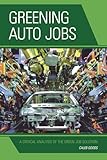Greening auto jobs: a critical analysis of the green job sol
Material type: TextLanguage: English Publication details: 2014Edition: e1ISBN:
TextLanguage: English Publication details: 2014Edition: e1ISBN: - 9780739189801
- 331.7629222 GOO-14
| Item type | Current library | Call number | Status | Date due | Barcode | |
|---|---|---|---|---|---|---|
 Books
Books
|
Indian Institute of Management Raipur Reference | 331.7629222 GOO-14 (Browse shelf(Opens below)) | Not for loan | 8388 |
Browsing Indian Institute of Management Raipur shelves, Shelving location: Reference Close shelf browser (Hides shelf browser)

|

|

|

|

|

|

|
||
| 331.4133 FOT-18 Gender and the organization: women at work in the 21st centu | 331.48130223 PRE-14 Gender considerations and influence in the digital media and | 331.702 DEN-16 The Routledge companion to the professions and professionalism / | 331.7629222 GOO-14 Greening auto jobs: a critical analysis of the green job sol | 331.76292220 ZHA-15 Inside China`s automobile factories: the politics of labor a | 331.87 GAL-09 Union revitalisation in advanced economies: assessing the co | 331.8811351 FAI-12 Unions and globalisation: governments, management, and the s |
Greening Auto Jobs: A Critical Analysis of the Green Job Solution details current and problematic understandings of what constitutes a \"green job.\" Adopting an approach grounded in critical political economy, this book presents a framework to scrutinize the green job solution and the theoretical framework which overwhelmingly informs contemporary green job creation efforts and ecological modernization. The text also explores the tensions that encircle the world of work and environmental action, often referred to as \"jobs versus the environment,\" by detailing the conflicting commitments of political-economic actors to the idea of green job creation. These conflicts are outlined through an examination of the political-economic debate that has surrounded the Australian Government's environmental plans from 2008 to 2012 and the conflicting positions of Australian trade unions on environmentally transitioning the world of work. Interviews with key political-economic actors provide in-depth and nuanced understandings of the varied perspectives of political and union leaders in Australia. The second part of the book presents a detailed case study of the posited green job solution within the specific context of the Australian automotive manufacturing industry. The case study is also informed by interviews with key industry, union, and policymakers. The automotive industry is scrutinized not only because it has expressed going green as important to its long-term economic future, but because the Australian Government declared that its .2 billion \"New Car Plan for a Greener Future\" policy would create green jobs. Therefore, the book engages with the task of examining the three multinational vehicle producers operating in Australia--Ford, GM Holden, and Toyota--and how they have responded and engaged with the idea of green jobs, greening the manufacturing process, and the vehicles they produce in Australia.
There are no comments on this title.

